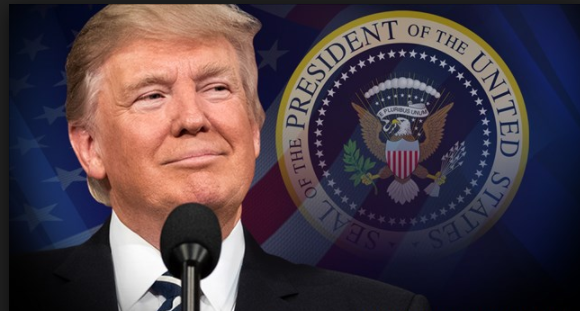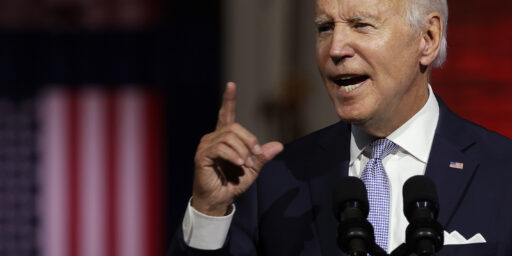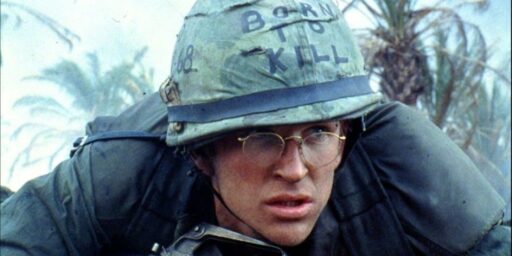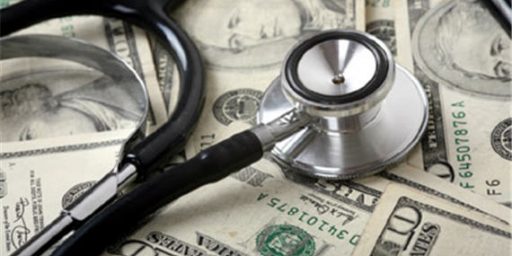Tough Talk on Drugs is Empty Talk
President Trump is not being bold on drugs. Instead, he is just recycling old, failed idea.
 President Trump gave remarks this week in New Hampshire about drug policy. The following is from the transcript of the speech:
President Trump gave remarks this week in New Hampshire about drug policy. The following is from the transcript of the speech:
[Drug traffickers] are terrible people, and we have to get tough on those people, because we can have all the Blue Ribbon committees we want, but if we don’t get tough on the drug dealers, we’re wasting our time. Just remember that. We’re wasting our time. And that toughness includes the death penalty. (Applause.)
You know, it’s an amazing thing. Some of these drug dealers will kill thousands of people during their lifetime — thousands of people — and destroy many more lives than that. But they will kill thousands of people during their lifetime, and they’ll get caught and they’ll get 30 days in jail. Or they’ll go away for a year, or they’ll be fined. And yet, if you kill one person, you get the death penalty or you go to jail for life.
So if we’re not going to get tough on the drug dealers who kills thousands of people and destroy so many people’s lives, we are just doing the wrong thing. We have got to get tough. This isn’t about nice anymore. This isn’t about committees. This isn’t about let’s get everybody and have dinners, and let’s have everybody go to a Blue Ribbon committee and everybody gets a medal for, frankly, talking and doing nothing. This is about winning a very, very tough problem. And if we don’t get very tough on these dealers, it’s not going to happen, folks. It’s not going to happen. And I want to win this battle.
I don’t want to leave at the end of seven years and have this problem, okay? (Applause.) I don’t want that. Right? Thank you. Not going to happen. Thank you all. A lot of voters in this room. I see that. Thank you. (Applause.) No, we’re going to solve this problem. We’re going to solve it with brains, we’re going to solve it with resolve, and we’re going to solve it with toughness. Because toughness is the thing that they most fear. That’s what they most fear.
As many readers are aware, a key part of my academic life has been the study of Latin America in general and the country of Colombia in specific. While my studies have been primarily focused on democratic institutions, it is impossible to study, and teach, about US-Latin American relations, let alone about the country of Colombia, without having to look at the US war on drugs, and into drug policy in general. Indeed, I created, and taught for many years, a course called “Drug War Politics in the Americas” (the contents of which were folded into a new class called “Latin American Security”).
So, I come from a position of some knowledge of this topic when I say: getting “tough” has never been missing in US anti-drug policy. Moreover, getting “tough” has not been especially efficacious.
A simple observation: if the risk of death was enough to deter drug dealers from dealing drugs, they would not be drug dealers. Being a drug dealer (not to mention being in the drug business writ large) is not a low-risk affair wherein the participants primarily worry about being exposed to Blue Ribbon committees. Rather, it is a business in which violent death is a daily potentiality, but also a business wherein the financial rewards are such that the risk is calculated by many to be worth it. Beyond that, it is already the case that incarceration is a major threat as well. As such, more toughness is unlikely to have any effect whatsoever.
And speaking of blasts from the past, any 80s kid will recognize the following:
The best way — so important — and the best way to beat the drug crisis is to keep people from getting hooked on drugs to begin with. As part of that effort — (applause) — so important. And this has been something that I’ve been very strongly in favor of: spending a lot of money on great commercials showing how bad it is, so that kids seeing those commercials during the right shows on television or wherever — the Internet — when they see these commercials they — “I don’t want any part of it.” That’s the least expensive thing we can do, where you scare them from ending up like the people in the commercials. And we’ll make them very, very bad commercials. We’ll make them pretty unsavory situations. And you’ve seen it before, and it’s had an impact on smoking and cigarettes. You see what happens to the body; you see what happens to the mind.
[…]
But we’re thinking about doing, really, a largescale rollout of commercials that show how bad it is for the kids. And when they see those commercials, hopefully, they’re not going to be going to drugs of any kind — drugs of any kind. And we’ll save a lot of lives, and we’ll make their life a lot easier.
To which I say: just say no to stupid policy retreads.
There is also the fact that he is tying all this to the border:
The second part of our initiative is to reduce the supply of illicit drugs. Ninety percent of the heroin in America comes from our southern border, where, eventually, the Democrats will agree with us and we’ll build the wall to keep the damn drugs out. (Applause.)
AUDIENCE: Build that wall! Build that wall! Build that wall!
I am highly skeptical that the wall will be cost effective in regards to illegal immigration, but I am certain that it will be of minimal efficacy against drug smuggling. First, drugs come in via otherwise legal crossings all the time (e.g., truck, shipping, etc.). The notion that it is primarily coming across via people walking through the desert is patently absurd. Second, beyond entry at legitimate entry points, drugs can easily go over or under the wall. Drug traffickers can use various means to launch packages of drugs over the wall (see the brief video here for examples). They do it now in places where there is already a barrier. And, there have been numerous sophisticated tunnels constructed under the border. The drugs are coming and will get in–there is too much money to be made for it to be otherwise. Decades of attempts at supply-side policies have demonstrated this to be unequivocally true. The problem is neither toughness nor adequate barriers at the border.
For example, an NYT story from 2016 notes (emphasis mine):
In the last five years, the authorities said, they have found more than 75 cross-border tunnels, mostly in areas of California and Arizona where there are enough buildings to disguise illicit activity, and the soil is conducive to digging. In Tijuana, in particular, the tunnels are considered an intractable fact of life.
Specialists on border control say no one has a clear idea how many tunnels are operating, or how much of a role they play in the drug trade, but they will be a factor for the foreseeable future. In just the last month, another long tunnel was found linking Calexico to Mexicali, and a shorter one near Calexico.
This a repeating story that has been reported for well over a decade.
The only way to stop the drug problem is to lower demand. That isn’t easy.
Criminality and violence can be lessened if the profit motive is lessened (see, e.g., marijuana legalization some states). And while I am not suggesting wholesale legalization, I am saying that the punitive paradigm (to use language from a worth while on this subject by Bertram, et al.) has not been successful. We would be better off treating drug abuse as a public health problem. Punishing to deter trafficking and usage demonstrably does not work. Worse, the more dangerous it is to traffic in drugs, the more that can be charged for those drugs, and hence the incentive to produce, smuggle, and deal goes up, not down. As such, getting tough will have the opposite effect than the one Trump is promising.
We have to remember two things: 1) the black market and the punitive paradigm makes illicit drugs more expensive and hence more profitable, and the profits incentivizes supply, and 2) people like their intoxicants, and this is especially true of a fairly small percentage of the population who especially like the illegal ones we are talking about–and they like them enough to spend heavily and to take risks to get their drugs of choice. Any drug control policy that does not take these basic factors into account is doomed to fail (and no drug war policy of which I am aware does take them into account).
Getting tough and airing commercials is doomed to fail (and, of course, we know this is true because we have already been down this road multiple times).
I would note that in this area Trump is behaving like a standard issue Republican president (and not all that far off from a stand issue Democratic president).






I can’t find any Google corroboration, but I remember New York state having a drug-dealer death penalty in the sixties. Nelson Rockefeller was a big supporter. The problem was that there is no clear demarcation between the stereotypical evil drug pusher, a victimized user, and a guy who buys a bit for himself and a couple of buddies. This led to DAs and juries usually being reluctant to apply the sanctions.
I can’t wait for the first blond cheerleader or footballer player to get charged with this. It’s going to be a sh^tshow when they realize the “drug dealer” was someone that could have been their kids…. and just might be a few years from now.
The idiots who think this is a good idea imagine a menacing, seedy figure in the dark dealing death to the innocently ensnared “good people” or kids ….. and don’t realize it’s the guy next door or his kids most likely to be dealing to middle class people. How else do drugs get into the school? Kids bring ’em or steal their parents pills for some quick cash. Where does a nice, respectable teacher or businessman get his fix? Not the seedy part of town anymore! Nope, try a Target parking lot or car wash late at night. Add in that addicts can turn to dealing to make ends meet and suddenly the “good person” isn’t so good after all and your kid will get the death penalty instead of rehab….
Seriously, when rural America starts seeing it’s sons and daughters killed by Big Gov instead of “helping”, how do you think that’s going to go for the GOP? They say “kingpin” but come on, it’s gonna be some poor kid from a dying town that gets it first, not an El Chapo wannabe.
Just because I’ve been watching Tom Lehrer on Youtoob a lot, let me share:
http://www.youtube.com/watch?vpuu4cYfohgs
From 1953. The Old Dope Peddler.
(Edit): I see I screwed up the link. You know what to do.
It’s been a few years since i looked this up, but IIRC, US ports receive on the order of 10 Million shipping containers per year. ~One every 3 seconds. One single 53′ container can probly hold something like a Billion Ameros worth of cocaine.
Interdiction is stupid and futile.